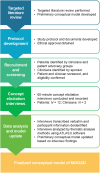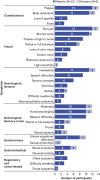Patient Experience of Myelin Oligodendrocyte Glycoprotein Antibody-Associated Disease: Qualitative Patient and Clinician Interviews Informing the Development of a Conceptual Model
- PMID: 40506564
- PMCID: PMC12255618
- DOI: 10.1007/s40120-025-00770-6
Patient Experience of Myelin Oligodendrocyte Glycoprotein Antibody-Associated Disease: Qualitative Patient and Clinician Interviews Informing the Development of a Conceptual Model
Abstract
Introduction: Myelin oligodendrocyte glycoprotein antibody-associated disease (MOGAD) is a rare, autoimmune demyelinating central nervous system disease. Currently, little is known about the signs, symptoms, and health-related quality of life (HRQoL) impact of MOGAD from the patient perspective. This study explored the patient experience of MOGAD through concept elicitation interviews with patients with MOGAD and clinicians to develop a conceptual model of MOGAD.
Methods: A preliminary conceptual model of MOGAD signs, symptoms, treatments, and HRQoL impacts was developed based on a review of the published literature. Thematic analysis of semi-structured interviews with patients and clinicians was used to develop the final conceptual model.
Results: Twelve patients with MOGAD and two clinicians were interviewed. The most common patient-reported symptoms were eye pain, fatigue, body aches/pain, headaches, and blurred vision. Eye pain and body aches/pain were reported as the most bothersome symptoms and most important to improve with treatment. The HRQoL impacts most commonly reported by patients were difficulty with carrying out household chores, inability to work, depression, and difficulty walking. Impacts on work/school were considered by patients as the most bothersome to their HRQoL and the most important to resolve. Following the interviews, a final conceptual model was produced that reported 32 symptoms across seven domains (constitutional; visual; general neurological; sensory-motor neurological; genitourinary; gastrointestinal; and chest-related, respiratory, and throat) and 50 HRQoL impacts across eight domains (emotional wellbeing, activities of daily living, physical functioning, social functioning, work/school, cognitive functioning, sleep, and financial).
Conclusions: This study provides important insights into the patient experience of MOGAD from patient and clinician perspectives, highlighting the underappreciated burden of the disease. The final conceptual model demonstrates the heterogeneity of MOGAD symptoms and their impact on patients' HRQoL. Future treatment trials should consider including appropriate measures to evaluate the key symptoms and HRQoL impacts identified in this study.
Keywords: Conceptual model; Disease burden; Health-related quality of life (HRQoL); Myelin oligodendrocyte glycoprotein antibody-associated disease (MOGAD); Qualitative interviews.
Plain language summary
Myelin oligodendrocyte glycoprotein antibody-associated disease (MOGAD) is a rare, autoimmune disease in which the immune system attacks the fatty substance that protects nerves in the central nervous system. MOGAD shares overlapping similarities with multiple sclerosis and neuromyelitis optica spectrum disorder. MOGAD has recently been recognized as a distinct disease, and studies exploring the patient experience of MOGAD are limited. This study was conducted to better understand the symptoms of MOGAD and how MOGAD affects quality of life (impacts). We collected information from published studies and patient blogs and conducted interviews with patients and doctors who treat MOGAD. This information was used to develop a visual representation of the patient experience called a ‘conceptual model,’ which includes information about specific symptoms and impacts. The conceptual model includes 32 symptoms and 50 impacts of MOGAD. MOGAD symptoms were grouped into categories: constitutional (general effect of the disease); visual; neurological (general, affecting the brain, spinal cord or nerves; and sensory-motor, affecting how the brain processes sensory information and controls motor movement); genitourinary (affecting reproductive and urinary systems); gastrointestinal (digestive); and chest-related, respiratory (breathing), and throat. MOGAD was found to impact activities of daily living (essential tasks that allow a person to live independently), physical functioning, emotional wellbeing, social functioning, cognitive functioning, work/school, sleep, and finances. The model shows that MOGAD has many different symptoms and that the disease can impact many aspects of patients’ lives. The conceptual model and study findings can inform future clinical trials to ensure that symptoms most important to patients are addressed by treatments.
© 2025. The Author(s).
Conflict of interest statement
Declarations. Conflicts of Interest: Jeffrey L. Bennett has served as a Consultant for Horizon Therapeutics, Genentech, TG Therapeutics, Reistone Bio, Roche, Antigenomycs, Chugai, Mitsubishi Tanabe, EMD Serono, Beigene, Novartis, and ImCyse. He has served on scientific advisory and Data Safety Monitoring boards for Clene Nanomedicine and Roche. He serves on a Speakers Bureau for Alexion and received research support from Novartis and Alexion. Asha Paireddy is an employee of UCB. Charlotte Cox is an employee of Adelphi Values, a health outcomes agency that was commissioned by UCB to conduct the research. Megan Mayhew is an employee of Adelphi Values, a health outcomes agency that was commissioned by UCB to conduct the research. Julia Stein is an employee of Adelphi Values, a health outcomes agency that was commissioned by UCB to conduct the research. Teresa Gasalla is an employee of UCB. Béatrice Tugaut is an employee and shareholder of UCB. Ethical Approval: This study was conducted in accordance with the Declaration of Helsinki, International Conference on Harmonization guidelines for Good Clinical Practice, and other current data-protection guidance. Ethical approval was provided by Western Copernicus Group Independent Review Board (IRB #20222224; valid from December 19, 2022 to May 2, 2023). Written informed consent was obtained from each patient and clinician prior to study participation.
Figures




Similar articles
-
Understanding the Patient Experience of Advanced Parkinson's Disease: Qualitative Research with Patients and Expert Clinicians to Identify Symptoms and Associated Health-Related Quality of Life Impacts.Neurol Ther. 2025 Aug;14(4):1383-1417. doi: 10.1007/s40120-025-00747-5. Epub 2025 May 13. Neurol Ther. 2025. PMID: 40358908 Free PMC article.
-
Uncommon Non-MS Demyelinating Disorders of the Central Nervous System.Curr Neurol Neurosci Rep. 2025 Jul 1;25(1):45. doi: 10.1007/s11910-025-01432-8. Curr Neurol Neurosci Rep. 2025. PMID: 40591029 Review.
-
Signs and symptoms to determine if a patient presenting in primary care or hospital outpatient settings has COVID-19.Cochrane Database Syst Rev. 2022 May 20;5(5):CD013665. doi: 10.1002/14651858.CD013665.pub3. Cochrane Database Syst Rev. 2022. PMID: 35593186 Free PMC article.
-
NASH-CHECK patient-reported outcome instrument: evaluation of content and face validity for patients with metabolic dysfunction-associated steatohepatitis and compensated cirrhosis.J Patient Rep Outcomes. 2025 Jul 1;9(1):76. doi: 10.1186/s41687-025-00881-6. J Patient Rep Outcomes. 2025. PMID: 40591168 Free PMC article.
-
Sexual Harassment and Prevention Training.2024 Mar 29. In: StatPearls [Internet]. Treasure Island (FL): StatPearls Publishing; 2025 Jan–. 2024 Mar 29. In: StatPearls [Internet]. Treasure Island (FL): StatPearls Publishing; 2025 Jan–. PMID: 36508513 Free Books & Documents.
References
-
- Shahriari M, Sotirchos ES, Newsome SD, Yousem DM. MOGAD: how it differs from and resembles other neuroinflammatory disorders. Am J Roentgenol. 2021;216:1031–9. 10.2214/AJR.20.24061. - PubMed
-
- Banwell B, Bennett JL, Marignier R, Kim HJ, Brilot F, Flanagan EP, et al. Diagnosis of myelin oligodendrocyte glycoprotein antibody-associated disease: international MOGAD panel proposed criteria. Lancet Neurol. 2023;22:268–82. 10.1016/S1474-4422(22)00431-8. - PubMed
LinkOut - more resources
Full Text Sources

